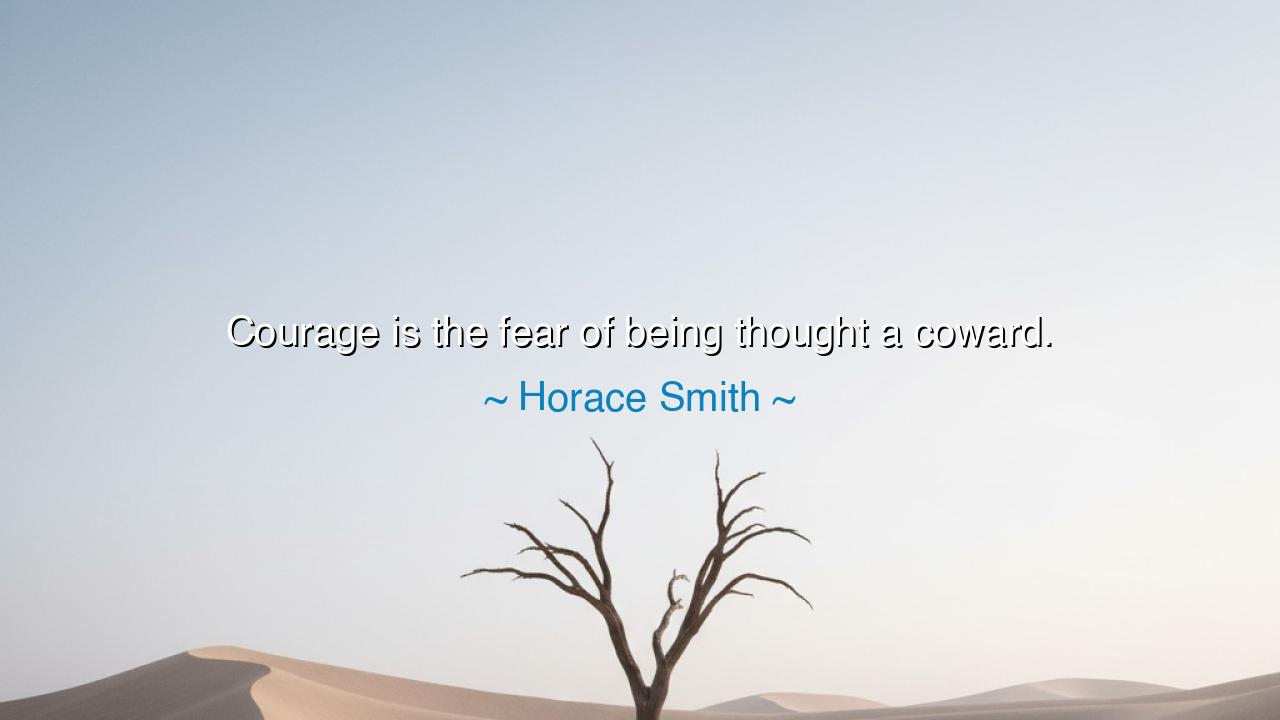
Courage is the fear of being thought a coward.






In the words of Horace Smith, “Courage is the fear of being thought a coward,” we find a truth that is at once paradoxical and profound. For in this single sentence, Smith unveils the fragile and complex heart of human bravery — that what the world calls courage is often born not from the absence of fear, but from its transformation. He reminds us that even the bravest souls are haunted by doubt, and that valor is not a denial of fear, but its mastery. The man who appears fearless is not one who feels nothing; he is one who, in the furnace of fear, refines his spirit into resolve.
The origin of this quote comes from the English poet and novelist Horace Smith, a contemporary of Shelley and Byron during the Romantic era — an age when the human heart and the human struggle were subjects of deepest contemplation. Smith, though less known than his companions, wrote often of courage, duty, and the frailty of human nature. In this line, he captures a timeless truth about the psychology of valor: that much of what men call heroism springs not from an absence of terror, but from the inner refusal to be ruled by it — and sometimes, from the burning shame of what it would mean to yield.
This insight finds echoes in the annals of history. Consider the soldiers at Thermopylae, the three hundred Spartans who stood against the might of Persia. Were they without fear as they faced certain death? Surely not. But the fear that truly guided them was not of death itself, but of dishonor — the fear of being thought cowards before their city, their comrades, and their ancestors. That sacred fear — the fear of moral failure — transformed their trembling hearts into steel. Thus, Smith’s words remind us that even fear can become noble when it is directed toward virtue. When we dread shame more than suffering, cowardice more than death, we become capable of greatness.
The ancients knew that courage and fear are bound by an eternal thread. Aristotle, in his Nicomachean Ethics, wrote that courage is the mean between rashness and cowardice — not recklessness, nor retreat, but the perfect balance between prudence and honor. The truly brave man, said Aristotle, is not one who feels nothing, but one who endures in the face of fear for a worthy cause. So too does Smith’s quote illuminate the inner struggle of all who stand before danger. For to conquer fear is impossible; but to master it — to use it as a spur rather than a chain — that is the art of the courageous.
History offers us another image in the figure of Joan of Arc, the young peasant girl who led France’s armies under divine conviction. When brought to trial and threatened with death by fire, she trembled — yet her fear was not for her body, but for her soul, for the possibility of betraying her calling. Her courage was born not from fearlessness, but from the greater fear of being unfaithful to her purpose. In her trembling stood the strength of nations. Thus, the greatest acts of courage are not those that banish fear, but those that arise from a higher allegiance — to honor, duty, faith, and love.
Smith’s wisdom also offers a mirror to the human heart in times of moral trial. Not all battles are fought on fields of war. In our daily lives, we face choices that test the same spirit: to speak the truth when silence is easier, to act with integrity when deceit is safe, to defend the weak when the crowd is cruel. In these moments, we too feel the fear of ridicule, rejection, or failure. Yet it is the fear of cowardice, the dread of betraying one’s own conscience, that can awaken courage within even the humblest soul. The man who fears to be false to himself has already glimpsed greatness.
Let this then be the lesson for all who walk the path of life: do not despise fear, for it is the forge in which courage is made. Fear, when rightly guided, is a teacher, not an enemy. Let your fear of dishonor outweigh your fear of danger. Let your dread of cowardice drive you to noble action. When you tremble before the unknown, remember that courage is not the absence of trembling — it is the will that stands upright in spite of it.
So remember, O seeker of virtue: courage is not born in the absence of fear, but in the heart that fears the right thing. To fear death is human; to fear disgrace is divine. The man who values his honor above his safety will always walk the path of heroes. And though he may fall, the world will remember not his fear, but his courage — that sacred flame that burns brightest in the presence of darkness.






AAdministratorAdministrator
Welcome, honored guests. Please leave a comment, we will respond soon